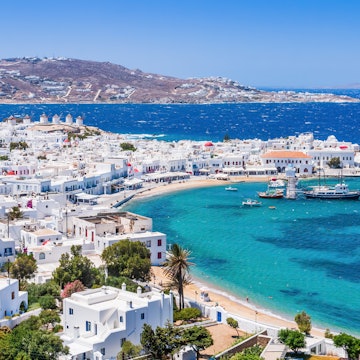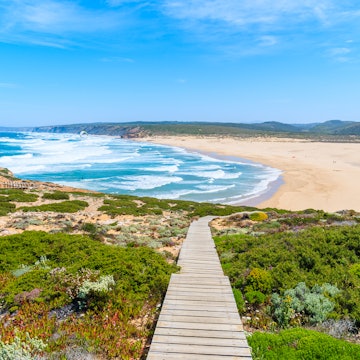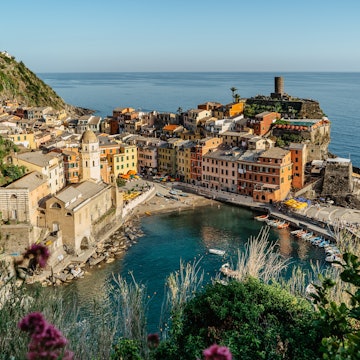
Chasing legends in Greece’s stunning Peloponnese
Sponsored by
Jun 15, 2022 • 4 min read

The Peloponnese embodies all the tangible and abstract elements that make up Greece © K. Vergas / Courtesy of Greek National Tourism Organization
Multiply everything a typical Greek island has to offer travelers, add some, and there will still be more to experience and enjoy at the Peloponnese.
This versatile peninsula is relatively untouched by mass tourism, and you’ll be rewarded for getting off the beaten path by this part of Greece that is fast climbing up the “bucket lists” of sophisticated and in-the-know travelers.

The heart and soul of Greece
The Peloponnese – or Moreas, as it was known in the medieval era – embodies all the tangible and abstract elements that make up Greece: Millenia-old history full of myths and legends, magnificent civilizations, suitors and conquerors, resistance and revolution, ancient sites and medieval castles, modern buzzing towns and picturesque villages, superb local cuisine and time-honored traditions, spectacular mountain scenery and crystal-clear waters, hospitality, and cordiality.
The peninsula has been inhabited since prehistorical times and derives its name from the myth of King Pelops. Over the centuries, the first great Greek civilization – the Mycenaean – flourished here, the first Olympic Games were held in Olympia in 776 BC, and two centuries ago the first revolutionary shot in the war of independence from the Ottomans was fired here.
The best sustainable tourism experiences in Greece

Gods, heroes, and mythological creatures
Hercules, the greatest of the ancient Greek heroes, is said to have performed most of his 12 arduous labors in the Peloponnese. The Nemean Lion, The Lernaean Hydra, the Erymanthian Boar, and the Stymphalian Birds, among others, were loathsome creatures which he hunted down in the mythological forests of the region.
According to Homer’s epic poems Iliad and Odyssey, it was here that Paris, the son of the king of Troy, lured away Helen, the queen of Sparta, causing the entire Greek world to fight the decade-long Trojan War.
It’s also said that Pan, the lustful, goat-legged god of the wild, shepherds, and fertility, was known to hang out in the green forests of Arcadia, accompanied by nymphs, dryads, and naiads – female immortal creatures that personified the wind through the leaves and the waters of the mountain springs and rivers.

A vast open-air museum
There is no end to significant archaeological sites you can admire in the Peloponnese.
These days Ancient Mycenae, home of Trojan War leader Agamemnon and the Atreides House, is one of the most impressive archaeological sites in the country and a World Heritage Monument. The Lion Gate, the Cyclopean Walls, the Royal Tombs, and the Treasury of Atreus, among other stunning ruins, are all visible and open to the public.
Ancient Olympia, the awe-inspiring birthplace of the Olympic Games, is also a sacred ancient site steeped in history and myth, with a unique atmosphere and energy. It features a small but important Archaeological Museum, and another dedicated to the history of the Games.
Archaeological Athens: Walking through the city’s history

The Ancient Theatre of Epidaurus – where performances of ancient plays still take place during the summer – is an uplifting location and experience not to be missed if you can score a ticket. Alternatively, visit the remains of the stadium at Ancient Nemea – once a sanctuary to Zeus and the home of the biannual Nemean Games, held in his honor.
Ancient Messini is a relatively underrated gem, even among Greeks. It’s an excavation in progress, with a wonderful reconstructed theatre and an impressive stadium dominating the landscape.
Finally, explore Ancient Corinth, where legend says Jason the Argonaut and Medea, his wife, took refuge. It was also one of the most prosperous city-states of antiquity, an important cultural and commercial center during the Roman period, and one of St Paul’s stops to teach the gospel of Christ. Relics of all these eras of the city remain, bearing witness to its glorious past.

Byzantine and medieval allure
After the Roman period, the Peloponnese became part of the eastern Byzantine Empire and a succession of invaders and conquerors – Slavs, Francs, Venetians, and Ottomans, among them – left their cultural marks on the peninsula.
Medieval and Byzantine remains are everywhere to be seen. The most important are the fortified city of Mystras, a Unesco World Heritage site, and the spectacular inhabited fortress on the rock of Monemvasia.
Many magnificent castles of the era are scattered around the peninsula – in Koroni, Methoni, Naflio, Kalamata, Patra, and Navarino among other – making the Peloponnese a history buff’s paradise and exciting terrain for anyone fascinated by the evolution of human civilization.

Legendary food and hospitality
There’s a lot more than the region’s glorious and turbulent past and its majestic monuments for contemporary explorers. The multifaceted nature of the Peloponnese – combining mountainous landscapes with thousands of miles of pristine beaches – offers countless choices for travelers.
The cuisine of the region, with many exclusive local delicacies cooked with domestically produced fresh ingredients, is widely acknowledged as one of the most flavorsome in the country. Gourmet and wonderfully basic Greek recipes abound for seafood and meat lovers, as well as vegetarians and vegans. The wines of the region, delicious crispy white and robust red varieties, are highly regarded among the internationally emerging Greek viniculture. Many can be savored and appreciated in the numerous local wineries surrounded by lovely vineyards, open for visits.
Last but not least, the local people, unaccustomed to the mass tourism of other destinations, give a warm reception and treat visitors as individual guests. They’ll happily share with you the best their land – blessed by gods and nature – has to offer.
Sponsored by Greek National Tourism Organisation
As a travel entertainment and inspirational media outlet, we sometimes incorporate brand sponsors into our efforts. This activity is clearly labeled across our platforms.
This story was crafted collaboratively between Greek National Tourism Organisation and Lonely Planet. Both parties provided research and curated content to produce this story. We disclose when information isn’t ours.
With sponsored content, both Lonely Planet and our brand partners have specific responsibilities:
-
Brand partner
Determines the concept, provides briefing, research material, and may provide feedback.
-
Lonely Planet
We provide expertise, firsthand insights, and verify with third-party sources when needed.
Take your Greece trip with Lonely Planet Journeys
Time to book that trip to Greece
Lonely Planet Journeys takes you there with fully customizable trips to top destinations–all crafted by our local experts.
























